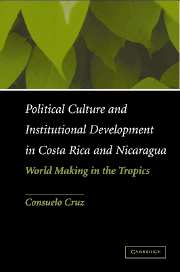 Political Culture and Institutional Development in Costa Rica and Nicaragua
Political Culture and Institutional Development in Costa Rica and Nicaragua Book contents
- Frontmatter
- Contents
- Acknowledgments
- List of Abbreviations
- Chronology
- Political Culture and Institutional Development in Costa Rica and Nicaragua
- Introduction
- 1 Theoretical Overview
- 2 Manichean Identities and Normative Scheming: Origins
- 3 Orphans of Empire: Constructing National Identities
- 4 Postcolonial Paths: Rhetorical Strategies and Frames
- 5 Costa Rica: Possibility Mongers
- 6 Nicaragua: Hybrid Arbitration
- 7 Tropical Histories: Paradise and Hell on Earth
- 8 Transition: Familiar Novelties
- Conclusion
- Index
7 - Tropical Histories: Paradise and Hell on Earth
Published online by Cambridge University Press: 20 August 2009
- Frontmatter
- Contents
- Acknowledgments
- List of Abbreviations
- Chronology
- Political Culture and Institutional Development in Costa Rica and Nicaragua
- Introduction
- 1 Theoretical Overview
- 2 Manichean Identities and Normative Scheming: Origins
- 3 Orphans of Empire: Constructing National Identities
- 4 Postcolonial Paths: Rhetorical Strategies and Frames
- 5 Costa Rica: Possibility Mongers
- 6 Nicaragua: Hybrid Arbitration
- 7 Tropical Histories: Paradise and Hell on Earth
- 8 Transition: Familiar Novelties
- Conclusion
- Index
Summary
A history is absorbed by its effects. At the same time … these effects change themselves without the past history ceasing to assist in [their] promotion. Each retrospective interpretation feeds off the pastness of an occurrence and seeks to articulate it anew in the present.
–Reinhart KoselleckThe complex dynamic outlined above by Koselleck is actually observable in part because political leaders make rhetorical use of “authorizing figures” – the icons of their nation's history – to bolster their own stature and plans of action. Think of American leaders' frequent invocation of great predecessors such as Thomas Jefferson and Abraham Lincoln. In Nicaragua, however, the notables who built the Regime of the Thirty Years, worthy as they might have been of enduring recognition, were never to become national authorizing figures. By way of contrast, the nineteenth century notables who built the Costa Rican polity are to this day publicly revered by new generations, both at the elite and popular levels. This reverence is especially evident at moments of perceived or real danger. In 1983, for example, as civil wars raged in Guatemala, El Salvador, and Nicaragua, the government of Costa Rica linked its proclamation of “perpetual neutrality” to the country's exceptionalist history. More significantly still, the country's president framed the proclamation as a direct extension of a policy established by the nation's founders – authorizing figures who from the distant past could still speak persuasively to those living in the present. Consider a key passage from the declaration:
… our first chief of state was a countryside teacher … who told Congress in 1829 that Costa Rica was simple and small, but that its government … rooted in the virtues, morality, and good judgment of its people, was able to keep the peace. … […]
- Type
- Chapter
- Information
- Political Culture and Institutional Development in Costa Rica and NicaraguaWorld Making in the Tropics, pp. 185 - 235Publisher: Cambridge University PressPrint publication year: 2005


